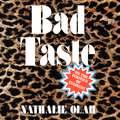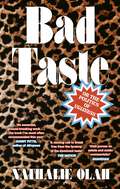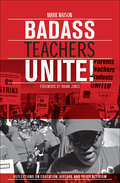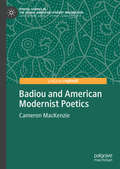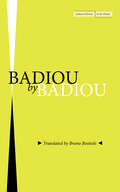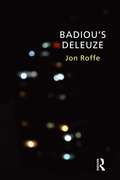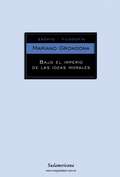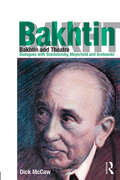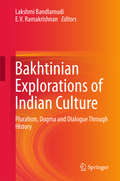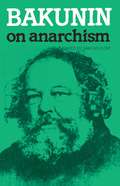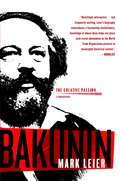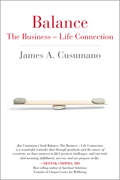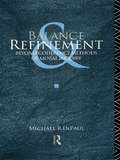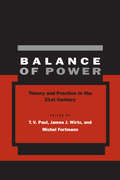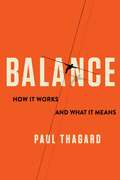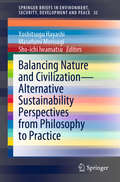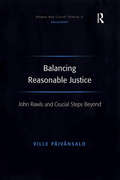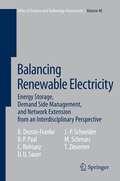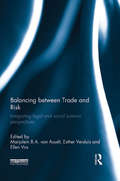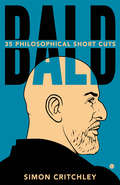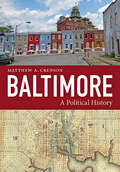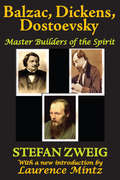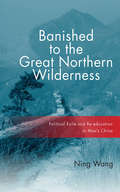- Table View
- List View
Bad Taste: Or the Politics of Ugliness
by Nathalie OlahA bold and original exploration from a renowned radical thinker, exploring the consequences of our obsession with image and taste.This is not a taste, nor an anti-taste, manual. This is an interrogation of the importance we place on seemingly objective ideas of taste in a culture that is saturated by imagery, and the dangerous impact this has on our identities, communities and politics. This book is dedicated to understanding the industries of taste. From the food we eat to the way we spend our free time, Olah exposes the shallow waters of 'good' and 'bad' taste and the rigid hierarchies that uphold this age-old dichotomy. -How did minimalism become a virtue, and who can afford to do it justice?When did blue-collar jackets become a fashion item?Who stands to gain from the distinction made between beauty, and sex?- Bold, original and provocative, Bad Taste is a revelatory exploration of the intersection between consumerism, class, desire and power, and a rousing call-to-arms to break free from the restrictive ways we see those around us.(P) 2023 Little Brown Book Group Limited for and on behalf of Dialogue Books
Bad Taste: Or the Politics of Ugliness
by Nathalie OlahA timely critique of consumer culture which captures this image-obsessed moment in history, perfect for fans of Zadie Smith's Feel Free and Jia Tolentino's Trick Mirror.This book is not a taste, nor an anti-taste, manual. This is an interrogation of the importance we place on seemingly objective ideas of taste in a culture that is saturated by imagery, and the dangerous impact this has on our identities, communities and politics. This book is dedicated to understanding the industries of taste. From the food we eat to the way we spend our free time, Olah exposes the shallow waters of 'good' and 'bad' taste and the rigid hierarchies that uphold this age-old dichotomy. -How did minimalism become a virtue, and who can afford to do it justice?When did blue-collar jackets become a fashion item?Who stands to gain from the distinction made between beauty, and sex?- Bold, original and provocative, Bad Taste is a revelatory exploration of the intersection between consumerism, class, desire and power, and a rousing call-to-arms to break free from the restrictive ways we see those around us.
Badass Teachers Unite!: Reflections on Education, History, and Youth Activism
by Mark NaisonAn academic exposes how dominant education reform policies destabilize low-income communities.In this incisive collection of essays, educator and activist Mark Naison draws on years of research on Bronx history and his own experience on the front lines of the education wars to unapologetically defend teachers and students from education “reform” policies that undermine their power and creativity.Naison shows how dominant education policy systematically hurts the very children it claims to support and instead forces them to “race to the top.” He exposes the Duncans, Rhees, and Gateses for schemes that intensify racial and economic inequality. And he refocuses the conversation on teaching and organizing strategies that should be implemented in communities everywhere.Praise for Badass Teachers Unite!“Mark Naison has woven a series of provocative essays into a powerful book. No traditional scholarly treatise, Badass Teachers Unite! is an education manifesto for the people’s school reform movement. With clarity, verve, and passion, Naison outlines the challenges we face in transforming public schools and he forges a guide to our actions. This book is must reading for anyone concerned about the plight of public schools in the USA today.” —Henry Louis Taylor Jr., director, UB Center for Urban Studies, University at Buffalo“Mark Naison is a badass?and it took one to write this rousing pronouncement to the militancy emerging among today’s schoolteachers . . . . Mark Naison’s Badass Teachers Unite! brings back the attitude we need to confront the corporate reform bullies and reclaim our schools.” —Jesse Hagopian, history teacher, Garfield High School, Seattle, Washington, and associate editor for Rethinking Schools magazine
Badiou and American Modernist Poetics (Pivotal Studies In The Global American Literary Imagination Ser.)
by Cameron MacKenzieBadiou and American Modernist Poetics explores the correspondence between Alain Badiou's thinking on art and that of the canonical modernists T.S. Eliot, Wallace Stevens, and Ezra Pound. Utilizing a multidisciplinary approach, the text engages with themes of the void, mastery, and place present in both modernist poetry and in Badiou’s philosophy. Through an examination of classic modernist texts, Cameron MacKenzie reveals that where Badiou hopes to go, the modernists have already been.
Badiou by Badiou (Cultural Memory in the Present)
by Alain BadiouAn accessible introduction to Badiou's key ideas In this short and accessible book, the French philosopher Alain Badiou provides readers with a unique introduction to his system of thought, summed up in the trilogy of Being and Event, Logics of Worlds, and The Immanence of Truths. Taking the form of an interview and two talks and keeping in mind a broad audience without any prior knowledge of his work, the book touches upon the central concepts and major preoccupations of Badiou's philosophy: fundamental ontology, mathematics, politics, poetry, and love. Well-chosen examples illuminate his thinking in regards to being and universality, worlds and singularity, and the infinite and the absolute, among other topics. A veritable tour de force of pedagogical clarity, this new student-friendly work is perhaps the single best general introduction to the work of this prolific and committed thinker. If, for Badiou, the task of philosophy consists in thinking through the truths of our time, the texts collected in this small volume could not be timelier.
Badiou's Deleuze
by Jon RoffeBadiou's Deleuze presents the first thorough analysis of one of the most significant encounters in contemporary thought: Alain Badiou's summary interpretation and rejection of the philosophy of Gilles Deleuze. Badiou's reading of Deleuze is largely laid out in his provocative book, Deleuze: The Clamor of Being, a highly influential work of considerable power. Badiou's Deleuze presents a detailed examination of Badiou's reading and argues that, whilst it fails to do justice to the Deleuzean project, it invites us to reconsider what Deleuze's philosophy amounts to, to reassess Deleuze's power to address the ultimate concerns of philosophy. Badiou's Deleuze analyses the differing metaphysics of two of the most influential of recent continental philosophers, whose divergent views have helped to shape much contemporary thought.
Badiou: A Subject To Truth
by Peter HallwardAlain Badiou is one of the most inventive and compelling philosophers working in France today—a thinker who, in these days of cynical resignation and academic specialization, is exceptional in every sense. Guided by disciplines ranging from mathematics to psychoanalysis, inspired as much by Plato and Cantor as by Mao and Mallarmé, Badiou&’s work renews, in the most varied and spectacular terms, a decidedly ancient understanding of philosophy—philosophy as a practice conditioned by truths, understood as militant processes of emancipation or transformation. This book is the first comprehensive introduction to Badiou&’s thought to appear in any language. Assuming no prior knowledge of his work, it provides a thorough and searching overview of all the main components of his philosophy, from its decisive political orientation through its startling equation of ontology with mathematics to its resolute engagement with its principal competition (from Wittgenstein, Heidegger, and Deleuze, among others). The book draws on all of Badiou&’s published work and a wide sampling of his unpublished work in progress, along with six years of correspondence with the author. Peter Hallward pays careful attention to the aspect of Badiou&’s work most liable to intimidate readers in continental philosophy and critical theory: its crucial reliance on certain key developments in modern mathematics. Eschewing unnecessary technicalities, Hallward provides a highly readable discussion of each of the basic features of Badiou&’s ontology, as well as his more recent account of appearance and &“being-there.&” Without evading the difficulties, Peter Hallward demonstrates in detail and in depth why Badiou&’s ongoing philosophical project should be recognized as the most resourceful and inspiring of his generation.
Bajo el imperio de las ideas morales
by Mariano GrondonaEn Bajo el Imperio de las Ideas Morales, se plantea que la fronteraentre el mundo del desarrollo y el mundo del subdesarrollo no es a nivelpolítico o económico si no netamente Cultural basándose así, en que lasemejanza entre estos dos mundo es el valor moral. En este libro, el autor restituye a las palabras "moral" y "ética"#palabras que el uso degrada o la exclusión vuelve demasiado abstractas#una significación plena. Para ello evoca y explica una línea depensamiento que va de Aristóteles a Heidegger sin pasar por alto lainfluencia insoslayable del idealismo y el pragmatismo anglosajones. Eldilema y los conflictos que plantea la moral han permitido, más queotros, el desarrollo de ciertas culturas; la ausencia de preocupaciónmoral, como contrapartida, ayuda a explicar la debilidad y el escasodesarrollo de otras.A partir de premisas certeras y válidas, Mariano Grondona llega aconclusiones de una sensatez esclarecedora, que nos ayudan a pensarahora y siempre, entre otras cosas, nuestra condición delatinoamericanos y argentinos dentro de un contexto alejado de lashabituales quejas y sospechas.
Bakhtin and Theatre: Dialogues with Stanislavski, Meyerhold and Grotowski
by Dick MccawWhat did Bakhtin think about the theatre? That it was outdated? That is ‘stopped being a serious genre’ after Shakespeare? Could a thinker to whose work ideas of theatricality, visuality, and embodied activity were so central really have nothing to say about theatrical practice? Bakhtin and Theatre is the first book to explore the relation between Bakhtin’s ideas and the theatre practice of his time. In that time, Stanislavsky co-founded the Moscow Art Theatre in 1898 and continued to develop his ideas about theatre until his death in 1938. Stanislavsky’s pupil Meyerhold embraced the Russian Revolution and created some stunningly revolutionary productions in the 1920s, breaking with the realism of his former teacher. Less than twenty years after Stanislavsky’s death and Meyerhold’s assassination, a young student called Grotowski was studying in Moscow, soon to break the mould with his Poor Theatre. All three directors challenged the prevailing notion of theatre, drawing on, disagreeing with and challenging each other’s ideas. Bakhtin’s early writings about action, character and authorship provide a revealing framework for understanding this dialogue between these three masters of Twentieth Century theatre.
Bakhtinian Explorations of Indian Culture: Pluralism, Dogma and Dialogue Through History
by E. V. Ramakrishnan Lakshmi BandlamudiThis volume, an important contribution to dialogic and Bakhtin studies, shows the natural fit between Bakhtin’s ideas and the pluralistic culture of India to a global academic audience. It is premised on the fact that long before principles of dialogism took shape in the Western world, these ideas, though not labelled as such, were an integral part of intellectual histories in India. Bakhtin’s ideas and intellectual traditions of India stand under the same banner of plurality, open-endedness and diversity of languages and social speech types and, therefore, the affinity between the thinker and the culture seems natural. Rather than being a mechanical import of Bakhtin’s ideas, it is an occasion to reclaim, reactivate and reenergize inherent dialogicality in the Indian cultural, historical and philosophical histories. Bakhtin is not an incidental figure, for he offers precise analytical tools to make sense of the incredibly complex differences at every level in the cultural life of India. Indian heterodoxy lends well to a Bakhtinian reading and analysis and the papers herein attest to this. The papers range from how ideas from Indo-European philology reached Bakhtin through a circuitous route, to responses to Bakhtin’s thought on the carnival from the philosophical perspectives of Abhinavagupta, to a Bakhtinian reading of literary texts from India. The volume also includes an essay on ‘translation as dialogue’ – an issue central to multilingual cultures – and on inherent dialogicality in the long intellectual traditions in India.
Bakunin on Anarchism
by Sam DolgoffA selection of writings by one of the most important practitioners of social revolution. "The best available in English. Bakunin's insights into power and authority, and the conditions of freedom, are refreshing, original and still unsurpassed in clarity and vision. I read this selection with great pleasure."--Noam Chomsky
Bakunin: Statism and Anarchy
by Marshall S. ShatzStatism and Anarchy is a complete English translation of the last work by the great Russian anarchist Michael Bakunin. It was written in 1873, in the aftermath of the rise of the German Empire and the clash between Bakunin and Karl Marx in the first International. Bakunin assesses the strength of a European state system dominated by Bismarck. Then, in the most remarkable part of the book, he assails the Marxist alternative, predicting that a "dictatorship of the proletariat" will in fact be a dictatorship over the proletariat, and will produce a new class of socialist rulers. Instead, he outlines his vision of an anarchist society and identifies the social forces he believes will achieve an ananarchist revolution. Statism and Anarchy had an immediate influence on the "to the people" movement of Russian populism, and Bakunin's ideas inspired other anarchist movements. This is the only complete and reliable rendition of Statism and Anarchy in English, and in a lucid introduction Marshall Shatz locates Bakunin in his immediate historical and intellectual context, and assesses the impact of his ideas on the wider development of European radical thought. A guide to further reading and a chronology of events are appended as aids to students encountering Bakunin's thought for the first time.
Bakunin: The Creative Passion -- A Biography
by Mark LeierThe spellbinding story of both the man and the theory, Bakunin chronicles one of the most notorious radicals in history: Mikhail Bakunin, the founder of anarchism, here revealed as a practical moral philosophy rooted in a critique of wealth and power. Mark Leier corrects many of the popular misconceptions about Bakunin and his ideas, offering a fresh interpretation of his life and thoughts. Bakunin is an insightful read for all those who wish to better understand the fundamental basis of modern radical movements.
Balance
by James A. CusumanoJames Cusumano has led many lives. Implementing his success as an entertainer, scientist, corporate executive, and entrepreneur as a template, Cusumano shares his multifaceted guide to success, personal fulfillment, and balance. This easy-to-follow, autobiographical guidebook, Balance: The BusinessOCoLife Connection, instructs readers in methods whic"
Balance and Refinement: Beyond Coherence Methods of Moral Inquiry
by Michael R. DePaulWe all have moral beliefs. But what if one beleif conflicts with another? DePaul argues that we have to make our beliefs cohere, but that the current coherence methods are seriously flawed. It is not just the arguments that need to be considered in moral enquiry. DePaul asserts that the ability to make sensitive moral judgements is vital to any philosophical inquiry into morality. The inquirer must consider how her life experiences and experiences with literature, film and theatre have influenced her capacity for making moral judgments and attempt to ensure that this capacity is neither naive nor corrupted.
Balance of Power: Theory and Practice in the 21st Century
by T. V. PaulSince the 16th century, balance of power politics have profoundly influenced international relations. But in recent years—with the sudden disappearance of the Soviet Union, growing power of the United States, and increasing prominence of international institutions—many scholars have argued that balance of power theory is losing its relevance. This book examines the current position and future of balance of power dynamics in international politics. In this book, prominent scholars pay special attention to the theoretical and historical criticisms of balance of power theory while empirically assessing its validity at both global and regional levels. The volume also looks at systemic factors favoring or hindering a return to balance of power politics. It evaluates the challenges posed by subnational actors, such as terrorist groups, and weapons of mass destruction to international order. Further, it examines the relevance of balance of power axioms in selected regions: Western Europe, Eastern Europe, East Asia, South Asia, and Latin America.
Balance: How It Works and What It Means
by Paul ThagardLiving is a balancing act. Ordinary activities like walking, running, or riding a bike require the brain to keep the body in balance. A dancer’s poised elegance and a tightrope walker’s breathtaking performance are feats of balance. Language abounds with expressions and figures of speech that invoke balance. People fret over work-life balance or try to eat a balanced diet. The concept crops up from politics—checks and balances, the balance of power, balanced budgets—to science, in which ideas of equilibrium are crucial. Why is balance so fundamental, and how do physical and metaphorical balance shed light on each other?Paul Thagard explores the physiological workings and metaphorical resonance of balance in the brain, the body, and society. He describes the neural mechanisms that keep bodies balanced and explains why their failures can result in nausea, falls, or vertigo. Thagard connects bodily balance with leading ideas in neuroscience, including the nature of consciousness. He analyzes balance metaphors across science, medicine, economics, the arts, and philosophy, showing why some aid understanding but others are misleading or harmful. Thagard contends that balance is ultimately a matter of making sense of the world. In both literal and metaphorical senses, balance is what enables people to solve the puzzles of life by turning sensory signals or an incongruous comparison into a coherent whole.Bridging philosophy, psychology, and neuroscience, Balance shows how an unheralded concept’s many meanings illuminate the human condition.
Balancing Nature and Civilization - Alternative Sustainability Perspectives from Philosophy to Practice (SpringerBriefs in Environment, Security, Development and Peace #32)
by Yoshitsugu Hayashi Masafumi Morisugi Sho-Ichi IwamatsuThis book is an outcome of an international symposium: Sustainability –Can We Design the Future of Human Life and the Environment? which was held as a satellite event of the “Love the Earth”-Expo 2005 (Aichi, Japan). Each chapter is based on the lecture given by the following eminent researchers: Yoshinori Ishii, Hans-Peter Dürr, Yoshinori Yasuda, Minoru Kawada, Yasunobu Iwasaka, Werner Rothengatter, Hisae Nakanishi, Yang Dongyuan, Lee Schipper, Itsuo Kodama, and Yoshitsugu Hayashi.In the Part I titled “A Sustainable Relationship between Nature and Humans”, we discuss what will become of fossil fuels and petroleum, and what kind of indicators should be used to monitor the energy expended by human society. We then discuss environmental impacts caused by different civilizations and values on Nature and ethics, based on the perspective of environmental archaeology and on the discussions by Kunio Yanagita, the father of Japanese folklore study.The Part II is titled and shows “International Conflict Concerning Environmental Damage and Its Causes”. The Asian dust (Kosa) is a typical example of transboundary conflicts between nations. Another example can be found in the EU’s attempt to put in place a common motorway toll system across EU countries having different geographical and economic conditions. Finally, Part III covers the opinions and further debates on sustainable future earth based on the lectures in Parts I and II.We hope that great insights in this book will come across to readers, and be of help in steering the world towards a sustainable society in harmony with biosystems on earth.
Balancing Reasonable Justice: John Rawls and Crucial Steps Beyond
by Ville PäivänsaloJohn Rawls's pioneering work of political philosophy A Theory of Justice has had far reaching influence on modern liberal political philosophy. Rawls' sprinciples of justice as fairness: the principle of liberty, the principle of fair equality of opportunity and the famous 'difference principle' have been both heavily criticized and incorporated into other political theories. In this book Päivänsalo both presents a deep analysis of the whole Rawlsian canon and builds upon and goes beyond Rawls's conception by introducing a fresh theoretical framework to clarify and modify different balances of the elements of Rawlsian justice. Justice as fairness is analyzed into its parts and elements, critically examined to find the strongest most favourable interpretations of each principle and in this light the principles are reconstructed and rebalanced in such a way as to resist the most significant criticisms of the Rawlsian project.
Balancing Renewable Electricity: Energy Storage, Demand Side Management, and Network Extension from an Interdisciplinary Perspective (Ethics of Science and Technology Assessment #40)
by Christian Rehtanz Bert Droste-Franke Jens-Peter Schneider Miranda Schreurs Dirk Uwe Sauer Thomas Ziesemer Boris P. PaalAn important aim behind the restructuring of Germany's and Europe's electricity systems is to reduce the environmental burden, especially with respect to greenhouse gas emissions, of the current systems. Emissions must be brought down to a level that is sustainable in the long run and consistent with greenhouse gas emission reduction goals. Meeting these goals will require a system (as best as current knowledge suggests) that will be able to cope simultaneously with the fundamental demands for economic efficiency, environmental sustainability and supply security. Making use of existing scenarios, this study sketches such a system. It focuses in particular on auxiliary systems such as energy storage methods and network extensions. The study introduces technologies that can balance electricity in energy systems and that can serve as enabling technologies for the integration of large quantities of renewable energies in the power supply system. It begins with a discussion of normative aims for the future electricity system before continuing with a description of current policies and political developments and an overview of relevant existing energy system studies. These sections serve as background for the remainder of the study. They are followed by discussion and analysis of the growing demand for means to balance the fluctuations found in electricity generated in power systems with a high penetration of renewable energies, the potentials of diverse technologies, requirements for electrical networks, economic impacts and important legal issues. Finally, the main challenges to the achievement of developing balancing technologies and processes for renewable electricity-dominant systems are summarised and recommendations made.
Balancing between Trade and Risk: Integrating Legal and Social Science Perspectives
by Ellen Vos Marjolein B.A. van Asselt Esther VersluisThe trade aspects of risk and the risk aspects of trade deserve more systematic and genuine interdisciplinary attention if we are to really understand the global, international and supranational dimensions of risk regulation. This book brings together legal and social science research on risk regulation from across the world to explore risk regulation in a trade context. The interdisciplinary collaboration provided in this book is needed to address the trade versus risk balancing act both in empirical and theoretical terms. Although it is obvious that legal, social, cultural and political matters interfere with risk regulation, analyses in which these interferences are adequately considered are lacking. In one way or another, all chapters in this book address the issue of scientific uncertainty, the governance arrangements around expertise or both. Issues such as transparency, trust, legitimacy and precaution also become particularly important given the political, multi-actor and multi-level governance characteristics of the balancing act between trade and risk regulation. This book highlights and examines these concerns, going on to provide a critical assessment of the EU regulation of trade and risk both from external and internal perspectives. This book’s exploration of the balancing act between trade and risk regulation will be increasingly important to students of law and social sciences as they move to a shared, interdisciplinary understanding.
Bald: 35 Philosophical Short Cuts
by Simon CritchleyA new and expansive collection of essays from one of the world's best-known popular philosophers &“A genial exercise in public philosophy by an admittedly tonsorially challenged practitioner. . . . Ever current, Critchley closes with a meditation on Covid-19 and the anxieties it induces. . . . Along his path, he pauses to wonder whether philosophy has progressed at all over the centuries; to appreciate David Bowie&’s final album, Blackstar; . . . and to allow, with Pascal, that we&’re weak and wretched beings but eminently improvable.&”—Kirkus Reviews, Starred Review The moderator of the New York Times&’ Stone column and the author of numerous books on everything from Greek tragedy to David Bowie, Simon Critchley has been a strong voice in popular philosophy for more than a decade. This volume brings together thirty‑five essays, originally published in the Times, on a wide range of topics, from the dimensions of Plato&’s academy and the mysteries of Eleusis to Philip K. Dick, Mormonism, money, and the joy and pain of Liverpool Football Club fans. In an engaging and jargon‑free style, Critchley writes with honesty about the state of world as he offers philosophically informed and insightful considerations of happiness, violence, and faith. Stripped of inaccessible academic armatures, these short pieces bring philosophy out of the ivory tower and demonstrate an exciting new way to think in public.
Baltimore: A Political History
by Matthew A. CrensonHow politics and race shaped Baltimore's distinctive disarray of cultures and subcultures.Charm City or Mobtown? People from Baltimore glory in its eccentric charm, small-town character, and North-cum-South culture. But for much of the nineteenth century, violence and disorder plagued the city. More recently, the 2015 death of Freddie Gray in police custody has prompted Baltimoreans—and the entire nation—to focus critically on the rich and tangled narrative of black–white relations in Baltimore, where slavery once existed alongside the largest community of free blacks in the United States.Matthew A. Crenson, a distinguished political scientist and Baltimore native, examines the role of politics and race throughout Baltimore's history. From its founding in 1729 up through the recent past, Crenson follows Baltimore's political evolution from an empty expanse of marsh and hills to a complicated city with distinct ways of doing business. Revealing how residents at large engage (and disengage) with one another across an expansive agenda of issues and conflicts, Crenson shows how politics helped form this complex city's personality.Crenson provocatively argues that Baltimore's many quirks are likely symptoms of urban underdevelopment. The city's longtime domination by the general assembly—and the corresponding weakness of its municipal authority—forced residents to adopt the private and extra-governmental institutions that shaped early Baltimore. On the one hand, Baltimore was resolutely parochial, split by curious political quarrels over issues as minor as loose pigs. On the other, it was keenly attuned to national politics: during the Revolution, for instance, Baltimoreans were known for their comparative radicalism. Crenson describes how, as Baltimore and the nation grew, whites competed with blacks, slave and free, for menial and low-skill work. He also explores how the urban elite thrived by avoiding, wherever possible, questions of slavery versus freedom—just as wealthier Baltimoreans, long after the Civil War and emancipation, preferred to sidestep racial controversy. Peering into the city's 300-odd neighborhoods, this fascinating account holds up a mirror to Baltimore, asking whites in particular to reexamine the past and accept due responsibility for future racial progress.
Balzac, Dickens, Dostoevsky: Master Builders of the Spirit
by Stefan ZweigWritten over a period of twenty-five years, this first volume in a trilogy is intended to depict in the life and work of writers of different nationalities--Balzac, Dickens, and Dostoevsky--the world-portraying novelist. Though these essays were composed at fairly long intervals, their essential uniformity has prompted Zweig to bring these three great novelists of the nineteenth century together; to show them as writers who, for the very reason that they contrast with each other, also complete one another in ways which makes them round our concept of the epic portrayers of the world.Zweig considers Balzac, Dickens, and Dostoevsky the supremely great novelists of the nineteenth century. He draws between the writer of one outstanding novel, and what he terms a true novelist--an epic master, the creator of an almost unending series of pre-eminent romances. The novelist in this higher sense is endowed with encyclopedic genius, is a universal artist, who constructs a cosmos, peopling it with types of his own making, giving it laws of gravity that are unique to these fi gures.Each of the novelists featured in Zweig's book has created his own sphere: Balzac, the world of society; Dickens, the world of the family; Dostoevsky, the world of the One and of the All. A comparison of these spheres serves to prove their diff erences. Zweig does not put a valuation on the differences, or emphasize the national element in the artist, whether in a spirit of sympathy or antipathy. Every great creator is a unity in himself, with its own boundaries and specifi c gravity. There is only one specifi c gravity possible within a single work, and no absolute criterion in the sales of justice. This is the measure of Zweig, and the message of this book.
Banished to the Great Northern Wilderness: Political Exile and Re-education in Mao’s China (Contemporary Chinese Studies)
by Ning WangAfter Mao Zedong’s Anti-Rightist Campaign of 1957–58, Chinese intellectuals were subjected to "re-education" by the state. In Banished to the Great Northern Wilderness, Ning Wang draws on labor farm archives, interviews, and memoirs to provide a remarkable look at the suffering and complex psychological world of these banished Beijing intellectuals. Wang’s use of newly uncovered Chinese-language sources challenges the concept of the intellectual as renegade martyr, showing how exiles often declared allegiance to the state for self-preservation. While Mao’s campaign victimized the banished, many of those same people also turned against their comrades. Wang describes the ways in which the state sought to remold the intellectuals, and he illuminates the strategies the exiles used to deal with camp officials and improve their chances of survival.
